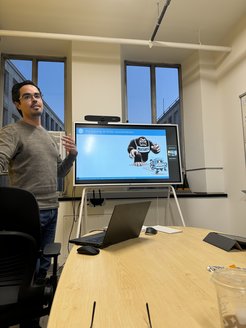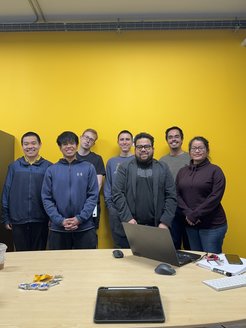Exploring Scientific Collaborations at Carnegie Mellon University
A Research Journey to Carnegie Mellon University in Pittsburgh, PA, USA

Embarking on a research stay can be a defining experience for any scientist. We want to share the most recent journey of Edgar Iván Sánchez Medina, a researcher from our International Research School, who spent three months at Carnegie Mellon University (CMU) in Pittsburgh, USA. This intense experience was not only an exploration of scientific collaboration, but also a cultural and professional adventure.
Edgar Iván Sánchez Medina, whose stay lasted from September 4th to November 24th, 2023, was hosted by the Gomes Group in both the Department of Chemistry and the Department of Chemical Engineering. The Mellon Institute, a beautiful and important landmark in chemical science, served as the hub for his work, adding a touch of historical context to his scientific pursuit.
Collaboration is essential for scientific progress, and Edgar Iván Sánchez Medina aimed to foster cross-disciplinary ties. The Gomes group's expertise in the intersection of computational chemistry and machine learning presented an ideal opportunity to share and develop strategies for advancing their shared research goals. The visit was driven by the acknowledgment that addressing complex challenges often requires the combination of diverse perspectives and skills.
He delved into the general problem of modelling fluid phase equilibria during his stay. The exploration centred around the application of data-driven tools to assist in modelling such physical phenomena, contributing to the evolving landscape of computational chemistry and machine learning.
Observing the scientific culture at the Gomes group was a highlight for Edgar Iván Sánchez Medina. The group's open-mindedness to new and ambitious ideas showcased a dynamic approach to scientific exploration. He appreciated the support that CMU provides to its young researchers. If you express your needs or ideas, the support is efficient and readily available. He also cherished social interactions with the welcoming community, engaging in activities like enjoying tacos and appreciating the vibrant atmosphere of scientific curiosity.

While the research stay proved fruitful, planning it was not without challenges. The lack of standardization for such stays added a layer of stress to the planning process. Overcoming this hurdle with the support of the IMPRS office highlighted the importance of institutional backing in making such endeavours easier. Additionally, the emotional challenge of being physically distant from home added a personal dimension to this experience.
Despite the challenges, Edgar Iván Sánchez Medina wholeheartedly recommends such experiences to others. The exposure to different scientific practices, the opportunity to forge international connections, and the chance to broaden one's research horizons make such stays invaluable. He emphasizes the lasting impact these research stays can have on personal and professional growth.
During his stay, he gained not only scientific knowledge but also insights into teamwork dynamics, soft skills crucial for high-performance teams, and strategies to maintain motivation. These experiences contribute to a more profound understanding of research environments and the broader skills required for success.
Looking ahead, Edgar Iván Sánchez Medina aspires to apply the lessons learned at CMU in shaping supportive and stimulating research atmospheres wherever he goes. He aims for a research environment with less bureaucracy and more support for young researchers, similar to the positive environment encountered during his time at CMU.
Edgar Iván Sánchez Medina expresses gratitude to Prof. Kai Sundmacher, Prof. Gabe Gomes, and the IMPRS office for their support in making this research stay possible.
In conclusion, this journey at CMU demonstrates the remarkable potential of international research stays. Beyond the scientific contributions, the experience can enrich one's perspective, fostering a commitment to creating collaborative and encouraging research environments in the future.













